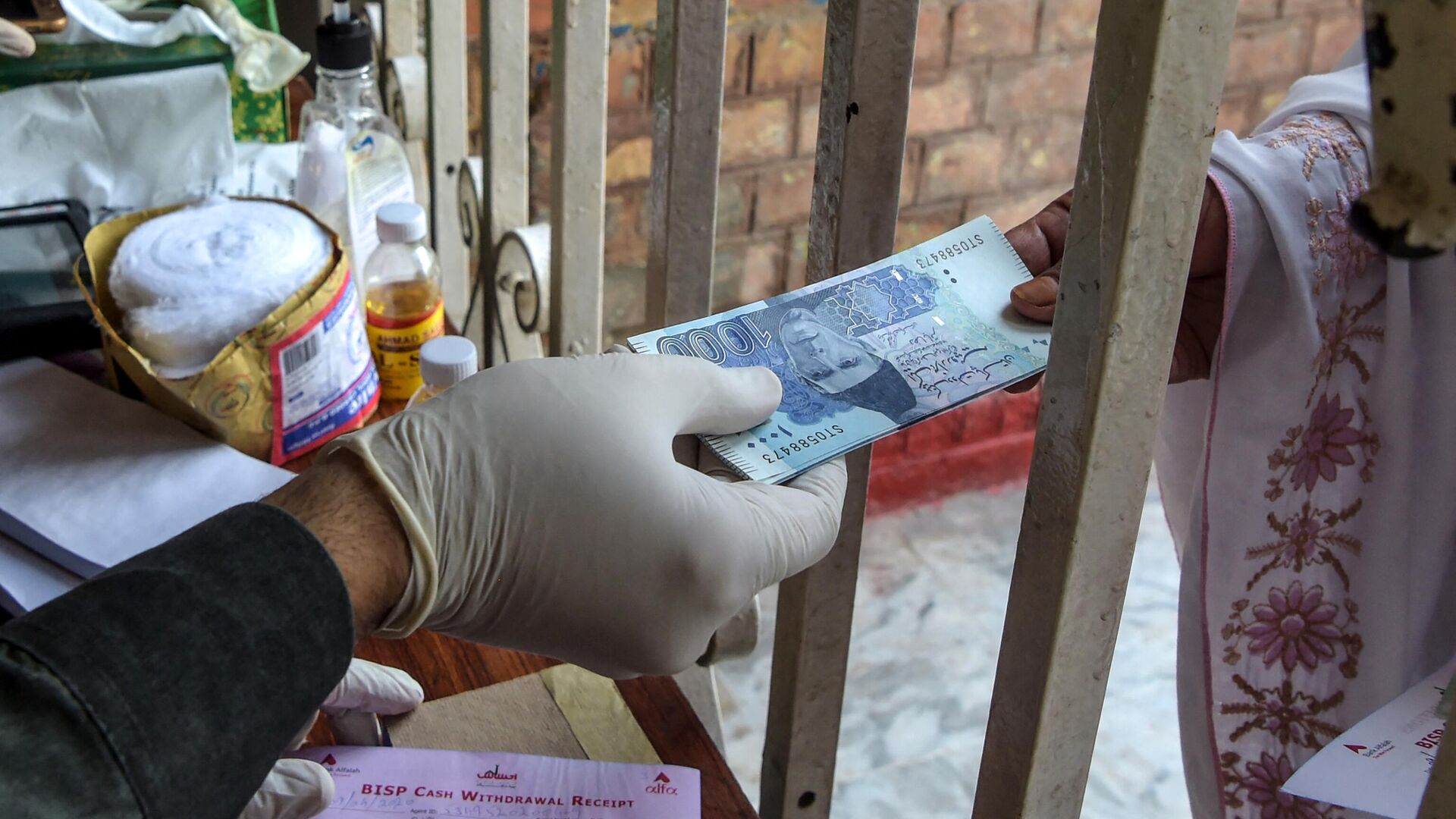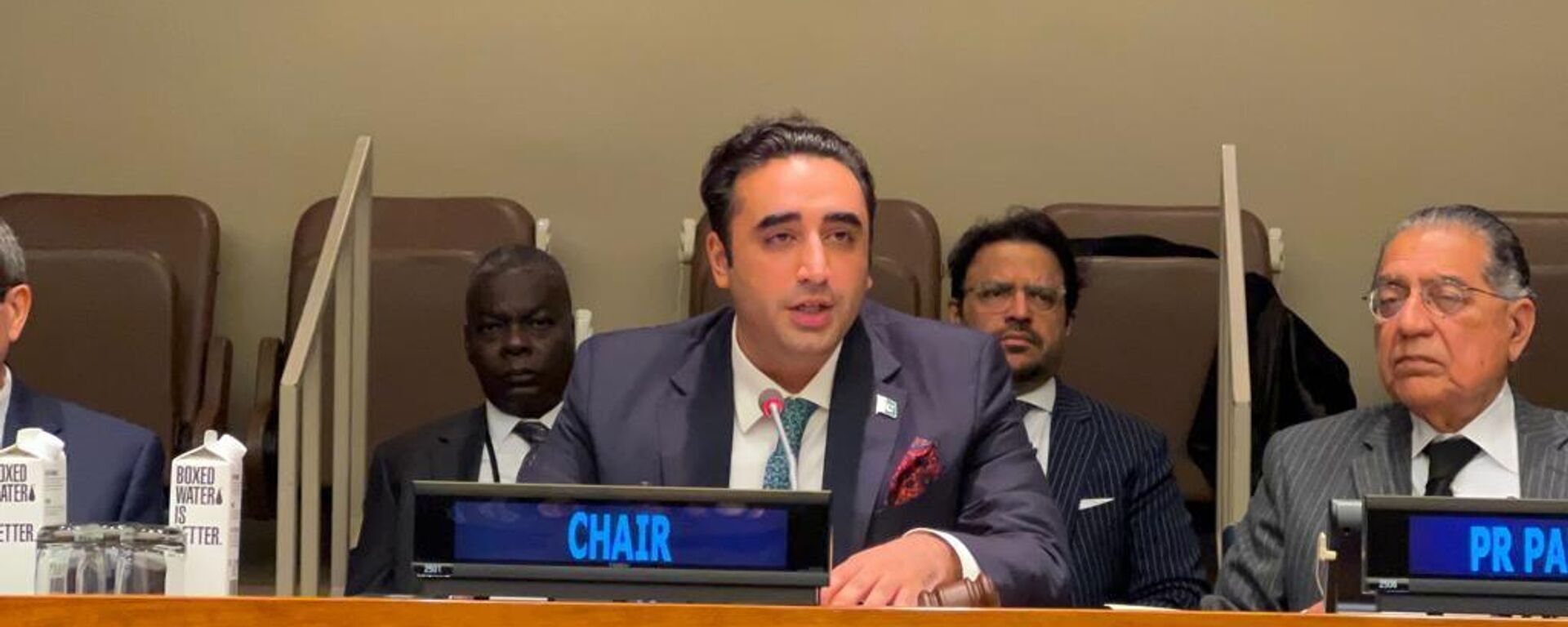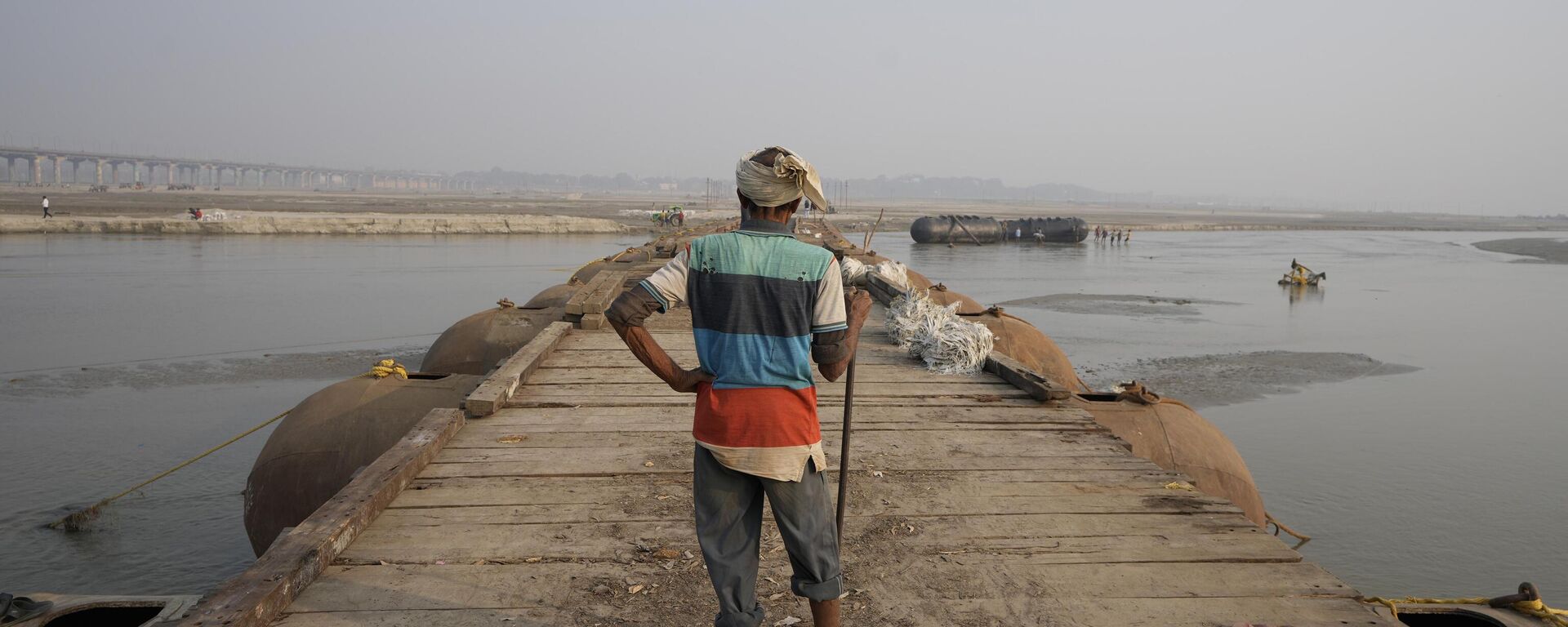https://sputniknews.in/20221227/deepening-economic-crisis-is-pakistan-facing-a-financial-emergency-274685.html
Deepening Economic Crisis: Is Pakistan Facing a Financial Emergency?
Deepening Economic Crisis: Is Pakistan Facing a Financial Emergency?
Sputnik India
Is Pakistan on the brink of the financial emergency?
2022-12-27T23:03+0530
2022-12-27T23:03+0530
2022-12-27T23:03+0530
world news
pakistan
https://cdn1.img.sputniknews.in/img/07e6/0c/1b/275051_0:161:3071:1888_1920x0_80_0_0_fe3fd511c5d299fdbcb50f777f59b6ee.jpg
According to a recent report by the World Bank, the national poverty rate may increase by 4%, which means that up to nine million Pakistanis may be hit by poverty within next year. Areas that were destroyed by the devastating floods are the most vulnerable and people residing in those regions require help and long-term recovery efforts.Currently, it seems that Pakistan's government is unable to strike a balance between providing relief to the needy and constraining the fiscal deficit. The economic crisis was at the center of a political standoff between Prime Minister Shehbaz Sharif and his predecessor Imran Khan earlier this year, which led to Khan's ouster in April 2022.Sharif accused Khan of economic mismanagement and ruining the country's foreign policy, forcing him to step down in a no-confidence vote. However, since Sharif came to power, the situation has not improved; on the contrary, Pakistan now faces a possible default.The constant depreciation of the Pakistani rupee is worsening the economic crisis and pushing the country to a financial emergency. At the end of March, the rupee stood at 183.48 to $1. On December 27, it closed at 226.71.The situation is made worse still by the country's rapidly depleting foreign exchange reserves. At the end of March 2022, the State Bank of Pakistan's (SBP) reserves stood at $11.425 billion, but they dropped to an almost four-year low of $6.715 billion in December, which is reportedly enough for just five weeks of imports.This drop of $4.71 billion or more than 41% in a little over eight months occurred primarily because of external debt payments and it has forced the SBP to restrict all foreign exchange outflows that can be delayed.Less Tea, More BorrowingIn order to advance a bailout deal with the International Monetary Fund (IMF), Pakistan's government lifted the cap on fuel prices back in May. The IMF also asked Islamabad to raise electricity prices, tax collection, and make substantial budget cuts.One such budget cut became a butt of jokes among Pakistanis after federal Minister for Planning and Development Ahsan Iqbal told reporters on May 14, 2022 that Pakistanis could reduce their tea consumption to "one or two cups" a day as imports were putting additional financial pressure on the government.The statement was mocked on social media, as Pakistanis claimed that their tea consumption was not the reason for the country's economic woes, it was due to poor governance and financial mismanagement by ministers.However, it should be noted that according to the Observatory of Economic Complexity, Pakistan is the world's largest tea importer, having bought more than $640 million worth of tea in 2020.A serious blow to the country's financial situation occurred during the catastrophic floods this summer, causing an economic loss of over $30 billion.Following the floods, the State Bank of Pakistan (SBP) said it had commitments of up to $4 billion from multilateral creditors such as the Asian Development Bank, the Asian Infrastructure Investment Bank, the World Bank, and the United Nations. It also said it planned to float a bond worth $2 billion this fiscal year.However, Pakistan's requirements are greater than that and the commitments are yet to be materialized.Islamabad has also reportedly asked Saudi Arabia to provide cash support of $3 billion in order to help the country meet external financing requirements in the next quarter. According to ARY, the finance minister asked the kingdom to do this favor, and it has also been reported that the new army chief on his expected visit to Saudi Arabia may discuss this proposition.Debt TrapOn top of that, Pakistan’s total external debt skyrocketed to Rs 26.5 trillion ($116 billion) - an addition of Rs6.8 trillion, or 35%, compared to last year.Aside from IMF loans, the federal government’s external debt rose to Rs 18 trillion in one year. There was a net increase of Rs 1.3 trillion in external debt, mainly caused by the depreciation of the rupee and the country’s aim to establish foreign currency reserves via borrowing.According to the State Bank of Pakistan, the country's debt with the IMF had increased by 44% in a single year to Rs 1.7 trillion by the end of September. This happened even though the IMF disbursed about $2 billion less than planned during this period.Moreover, the federal government’s total domestic debt increased to Rs 31.4 trillion, an addition of Rs 5 trillion, or 19% in one year.However, debt mismanagement, rupee devaluation, and rising inflation are causing political and security concerns in the country. External powers may use the unfavorable situation to put pressure on Pakistan."The government would be well advised to acknowledge that the existing policies are exacerbating the divide between the haves and the have-nots especially in the aftermath of the floods. To reiterate yet again the economic policies today are unacceptable to our external supporters, multilaterals and friendly countries," elaborated the State Bank of Pakistan in its annual report.
https://sputniknews.in/20221218/imran-khan-accuses-ex-pakistan-army-chief-of-hatching-conspiracy-against-him-133282.html
https://sputniknews.in/20221220/pakistans-foreign-minister-defends-remark-targeting-pm-modi-164304.html
https://sputniknews.in/20221214/uttar-pradesh-minister-vows-to-make-his-state-a-1-trillion-economy-86039.html
pakistan
Sputnik India
feedback.hindi@sputniknews.com
+74956456601
MIA „Rossiya Segodnya“
2022
Aneela Rashid
https://cdn1.img.sputniknews.in/img/07e6/0c/0d/74548_0:0:485:484_100x100_80_0_0_821526e967ae85d041e2d30ee34fa1de.jpg
Aneela Rashid
https://cdn1.img.sputniknews.in/img/07e6/0c/0d/74548_0:0:485:484_100x100_80_0_0_821526e967ae85d041e2d30ee34fa1de.jpg
News
en_IN
Sputnik India
feedback.hindi@sputniknews.com
+74956456601
MIA „Rossiya Segodnya“
Sputnik India
feedback.hindi@sputniknews.com
+74956456601
MIA „Rossiya Segodnya“
Aneela Rashid
https://cdn1.img.sputniknews.in/img/07e6/0c/0d/74548_0:0:485:484_100x100_80_0_0_821526e967ae85d041e2d30ee34fa1de.jpg
pakistan financial crisis, economic crisis in pakistan, pakistan economy, pakistani economy,
pakistan financial crisis, economic crisis in pakistan, pakistan economy, pakistani economy,
Deepening Economic Crisis: Is Pakistan Facing a Financial Emergency?
The summer monsoon floods, political instability, and turmoil in global markets have had a substantial negative impact on Pakistan's economy. Inflation in the country is disproportionately affecting the poor and forcing government officials to ask friendly countries for help.
According to a recent report by the World Bank, the national poverty rate may increase by 4%, which means that up to nine million Pakistanis may be hit by poverty within next year. Areas that were destroyed by the devastating floods are the most vulnerable and people residing in those regions require help and long-term recovery efforts.
Currently, it seems that Pakistan's government is unable to strike a balance between providing relief to the needy and constraining the fiscal deficit. The economic crisis was at the center of a political standoff between Prime Minister Shehbaz Sharif and his predecessor Imran Khan earlier this year, which led to Khan's ouster in April 2022.
Sharif accused Khan of economic mismanagement and ruining the country's foreign policy, forcing him to step down in a no-confidence vote. However, since Sharif came to power, the situation has not improved; on the contrary, Pakistan now faces a possible default.
The constant depreciation of the Pakistani rupee is worsening the economic crisis and pushing the country to a financial emergency. At the end of March, the rupee stood at 183.48 to $1. On December 27, it closed at 226.71.
The situation is made worse still by the country's rapidly depleting foreign exchange reserves. At the end of March 2022, the State Bank of Pakistan's (SBP) reserves stood at $11.425 billion, but they dropped to an almost four-year low of $6.715 billion in December, which is reportedly enough for just five weeks of imports.
This drop of $4.71 billion or more than 41% in a little over eight months occurred primarily because of external debt payments and it has forced the SBP to restrict all foreign exchange outflows that can be delayed.
In order to advance a bailout deal with the International Monetary Fund (IMF), Pakistan's government lifted the cap on fuel prices back in May. The IMF also asked Islamabad to raise electricity prices, tax collection, and make substantial budget cuts.
One such budget cut became a butt of jokes among Pakistanis after federal Minister for Planning and Development Ahsan Iqbal told reporters on May 14, 2022 that Pakistanis could reduce their tea consumption to "one or two cups" a day as imports were putting additional financial pressure on the government.
"The tea we import is imported on credit," Iqbal said, adding that businesses should be shut down first to save electricity.
The statement was mocked on social media, as Pakistanis claimed that their tea consumption was not the reason for the country's economic woes, it was due to poor governance and financial mismanagement by ministers.
However, it should be noted that according to the Observatory of Economic Complexity, Pakistan is the world's largest tea importer, having bought more than $640 million worth of tea in 2020.
A serious blow to the country's financial situation occurred during the catastrophic floods this summer, causing an economic loss of over $30 billion.
Following the floods, the State Bank of Pakistan (SBP) said it had commitments of up to $4 billion from multilateral creditors such as the Asian Development Bank, the Asian Infrastructure Investment Bank, the World Bank, and the United Nations. It also said it planned to float a bond worth $2 billion this fiscal year.
However, Pakistan's requirements are greater than that and the commitments are yet to be materialized.
Islamabad has also reportedly asked Saudi Arabia to provide cash support of $3 billion in order to help the country meet external financing requirements in the next quarter. According to ARY, the finance minister asked the kingdom to do this favor, and it has also been reported that the new army chief on his expected visit to Saudi Arabia may discuss this proposition.
On top of that, Pakistan’s total external debt skyrocketed to Rs 26.5 trillion ($116 billion) - an addition of Rs6.8 trillion, or 35%, compared to last year.
Aside from IMF loans, the federal government’s external debt rose to Rs 18 trillion in one year. There was a net increase of Rs 1.3 trillion in external debt, mainly caused by the depreciation of the rupee and the country’s aim to establish foreign currency reserves via borrowing.
According to the State Bank of Pakistan, the country's debt with the IMF had increased by 44% in a single year to Rs 1.7 trillion by the end of September. This happened even though the IMF disbursed about $2 billion less than planned during this period.
Moreover, the federal government’s total domestic debt increased to Rs 31.4 trillion, an addition of Rs 5 trillion, or 19% in one year.
"The lower-than-targeted tax collection, steep currency devaluation, high interest rates, rising expenditures along with losses incurred by state-owned companies and debt mismanagement were the main reasons for the surge in public debt," according to analyst Shahbaz Rana.
However, debt mismanagement, rupee devaluation, and rising inflation are causing political and security concerns in the country. External powers may use the unfavorable situation to put pressure on Pakistan.
"The government would be well advised to acknowledge that the existing policies are exacerbating the divide between the haves and the have-nots especially in the aftermath of the floods. To reiterate yet again the economic policies today are unacceptable to our external supporters, multilaterals and friendly countries," elaborated the State Bank of Pakistan in its annual report.





